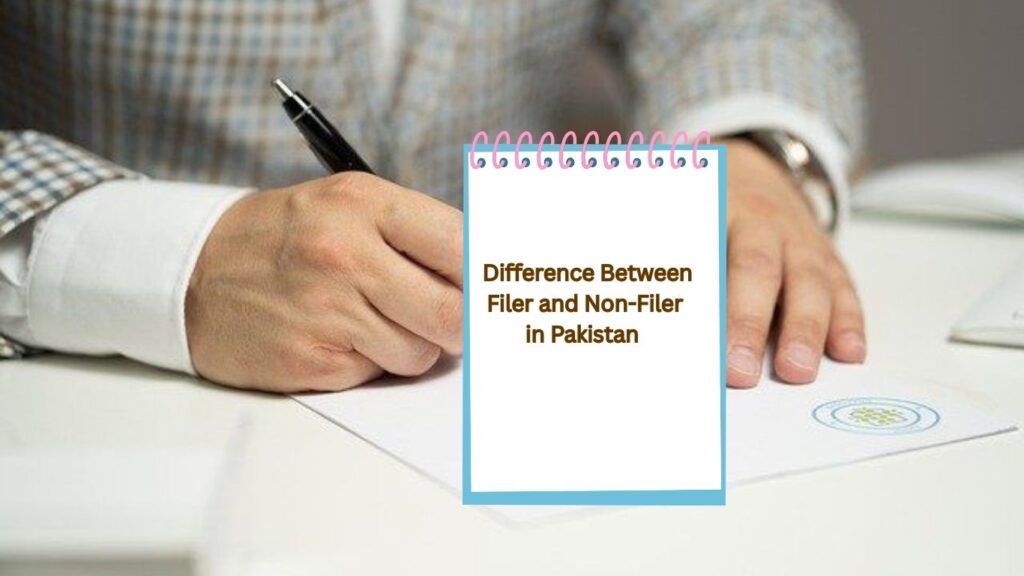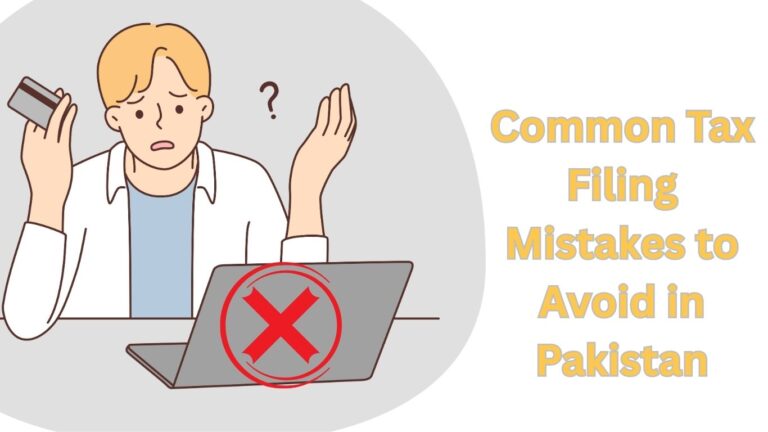If you’ve ever bought a car, a property, or even tried to open a business bank account in Pakistan, you’ve probably come across the terms “Filer” and “Non-Filer”. At first, they might sound like technical tax jargon, but in reality, they have a big impact on your life — from how much tax you pay to how easy it is to do certain things. So, what’s the real difference between a filer and non-filer in Pakistan? Let’s break it down in the simplest way possible, without using heavy legal words or boring definitions.

What Does “Filer” Mean in Pakistan?
A Filer is a person or business who is registered with the Federal Board of Revenue (FBR) and regularly submits their income tax returns. Think of it as someone who tells the government, “Hey, this is how much I earned this year, and this is how much tax I owe.” Being a filer means you’re officially part of Pakistan’s tax system.
It doesn’t matter if you are a salaried person, freelancer, business owner, or even just someone who owns a car — if you earn money in Pakistan and submit your income tax return, you’re a filer.
Who is a Non-Filer in Pakistan?
A Non-Filer is someone who does not submit their income tax return to FBR. That’s it. They might still be earning a lot of money, but they’re not officially declaring it to the government. This can be for many reasons — maybe they don’t know they’re supposed to file, maybe they’re avoiding taxes, or maybe they just never got around to it.
But here’s the catch: being a non-filer comes with extra penalties, higher tax rates, and limited access to certain services.
Why Does the Government Care About Filers and Non-Filers?
It’s simple. The government needs money to run the country — build roads, run hospitals, provide electricity, and pay salaries. This money mostly comes from taxes. So, if more people file their taxes, the government gets more money to improve public services.
To encourage people to file taxes, the government gives benefits to filers and imposes penalties on non-filers.
How to Know If You Are a Filer or Non-Filer
The easiest way to check is to visit the FBR’s website and search the Active Taxpayer List (ATL). If your name or your CNIC number appears there, congrats — you’re a filer. If not, then you’re considered a non-filer, and you’ll likely be paying more taxes on many transactions.
Benefits of Being a Filer in Pakistan
Let’s be honest, paying taxes isn’t fun. But being a filer actually comes with many advantages, especially in terms of saving money.
Lower Withholding Taxes
This is probably the biggest benefit. Whether you’re buying a car, registering property, withdrawing cash from your bank, or getting dividends from stocks — the tax rate is lower for filers. Non-filers often pay double or even triple the amount.
For example, if a filer is charged 1% tax while purchasing a vehicle, a non-filer may be charged 2% or more.
Easier Access to Loans and Credit
Banks and financial institutions prefer dealing with filers because they’re considered responsible and transparent. If you ever want to get a car loan, home loan, or even a business loan, being a filer gives you a much better chance of approval.
Peace of Mind
Let’s face it — constantly worrying about fines or getting notices from FBR isn’t fun. When you’re a filer, you’ve done your part. You’ve declared your income and paid your taxes. That brings peace of mind and legal protection.
Disadvantages of Being a Non-Filer in Pakistan
Now let’s talk about the downsides — and there are many. If you’re a non-filer, you’ll find that everything costs more, and the government will treat you as someone who is avoiding responsibility.
Higher Taxes on Everything
From withdrawing cash from the bank to purchasing a property, a non-filer is charged heavier taxes. For instance, when selling property, a non-filer may pay more in Capital Gains Tax than a filer.
Restricted Transactions
In recent years, the government has started banning non-filers from certain transactions. For example, a non-filer may not be allowed to buy a property over a certain value or purchase a new vehicle.
Red Flags for FBR
If you’re earning but not filing taxes, FBR could eventually send you notices, ask for explanations, or even impose fines. It’s like playing hide and seek with the government — not smart in the long run.
Major Differences Between Filer and Non-Filer
Let’s compare the two side by side so it’s easier to understand:
Income Tax Return
- Filer: Submits tax return every year
- Non-Filer: Doesn’t submit tax return
Withholding Tax Rate
- Filer: Lower
- Non-Filer: Higher (sometimes double)
Property Purchase Limit
- Filer: No major restrictions
- Non-Filer: Restrictions apply
Bank Transactions
- Filer: Lower tax on cash withdrawal
- Non-Filer: Higher tax on cash withdrawal
Vehicle Registration
- Filer: Lower registration fees
- Non-Filer: Higher fees and limited options

How to Become a Filer in Pakistan
Becoming a filer isn’t as hard as it sounds. Here’s how you can do it step-by-step:
Step 1: Get Your NTN (National Tax Number)
You can do this by registering on the FBR’s IRIS portal using your CNIC and phone number.
Step 2: File Your Income Tax Return
You’ll need to declare your income, assets, and any expenses. If you don’t know how to do it, there are many tax consultants who can help, or you can use the FBR mobile app which makes the process much simpler.
Step 3: Wait for the Active Taxpayer List (ATL)
Once your return is submitted, your name will appear on the ATL — and boom, you’re officially a filer.
Who Needs to Be a Filer?
Here’s a simple rule: If you’re earning money in Pakistan, whether as a freelancer, salaried employee, landlord, shopkeeper, or business owner, you should file taxes. Even if your income is below the taxable limit, you should still file a return — it shows you’re a responsible citizen.
Filer vs Non-Filer Property Tax in Pakistan
When it comes to property, the difference is massive. Let’s say you’re buying a house:
- Filer might pay 1% tax on the transaction
- Non-Filer could be paying 2% or even more
Over large transactions, this can add up to lakhs of rupees. So why pay extra when you don’t have to?
Can a Non-Resident Pakistani Become a Filer?
Yes, absolutely! Even if you’re living abroad but earning money in Pakistan — maybe through rental income or a business — you can and should register as a filer. It helps you avoid unnecessary taxes and also shows you’re following the system.
Common Myths About Being a Filer
Let’s bust a few common misconceptions:
Myth 1: Only Rich People Have to File Taxes
Wrong! Even if your income is low, you can file a return. Sometimes, this even helps you qualify for government relief programs or scholarships.
Myth 2: It’s Too Complicated
Honestly, it’s not anymore. With apps, tax consultants, and online portals, filing your return is now a lot easier than before.
Myth 3: FBR Will Harass Me If I File
This fear is common, but not really true. If your documents are clean and your return is accurate, there’s nothing to be afraid of. In fact, you’re less likely to get in trouble if you’re a filer.
Filing Taxes is Not Just a Duty, It’s a Smart Move
In a country like Pakistan, where the tax net is still growing, being a filer isn’t just a legal requirement — it’s also a smart financial decision. You save money, avoid trouble, and help build the country’s economy. It’s like choosing to drive on the smooth lane instead of bumping around on the rough side of the road.
So, the bottom line is simple: if you’re a filer, you get benefits, you pay less tax, and you stay on the right side of the law. If you’re a non-filer, you pay more, face restrictions, and may even run into legal issues later. The process of becoming a filer in Pakistan has become very easy, and there’s no reason not to do it. Don’t wait until it’s too late — file your taxes, be a responsible citizen, and enjoy all the perks that come with it.



